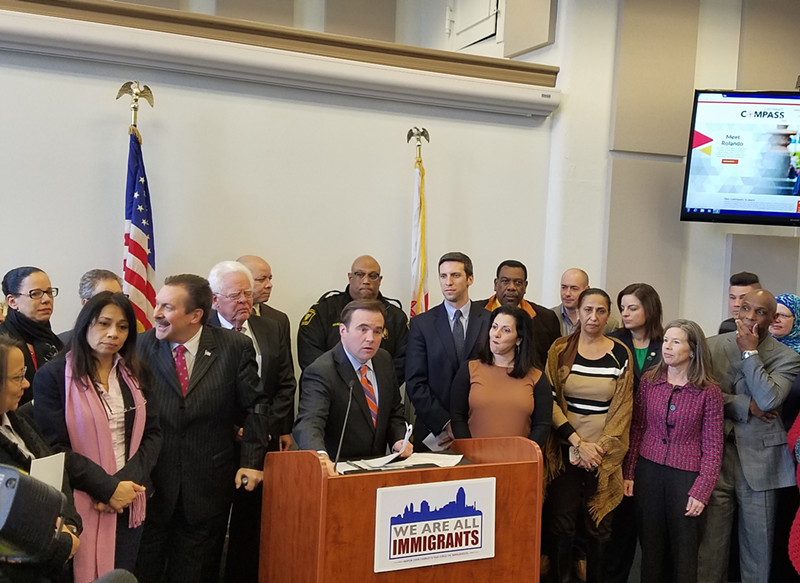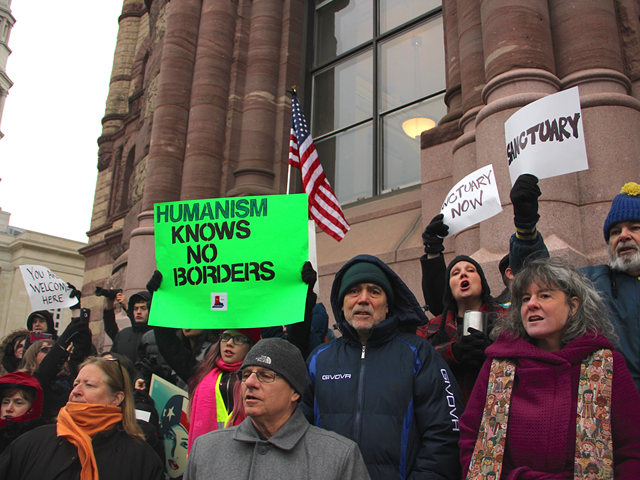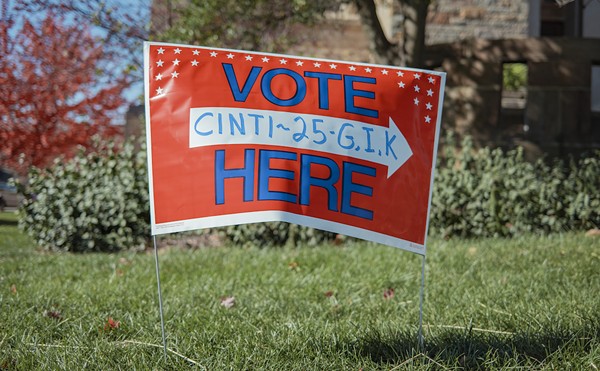
A diverse group of faith and nonprofit leaders and city, county and state elected officials including Mayor John Cranley today held a press conference to push back against President Donald Trump's executive order temporarily ending refugee resettlement in the U.S. and limiting travel from some Muslim-majority countries.
"We are here today because we are in a national moral crisis," Cranley said, referring to Trump's order, which paused all refugee resettlement for 120 days and banned travel to the U.S. for citizens of seven countries for 90 days. Those countries — Iran ,Iraq, Libya, Somalia, Sudan Syria and Yemen — are majority Muslim. No refugees from those countries have killed U.S. citizens on American soil, unlike some other countries not on Trump's list.
The move has drawn sharp rebuke from many corners of the country, even among conservatives. Locally, a number of elected officials spoke out quickly after the order was announced.
"This city has been for years and will remain a sanctuary city," Cranley said at the event. That's the first time the mayor or any city official has formally declared Cincinnati as such. Council members Wendell Young, Chris Seelbach and Yvette Simpson have worked on ordinances designed to formally designate Cincinnati a sanctuary city. Young drafted his Friday.
Trump has threatened the 200 or so cities across the country who describe themselves as sanctuary cities with a loss of federal security money in retribution. That could include Cincinnati.
While there's no set definition of a sanctuary city, the term generally means municipalities or other local governments don't aid Immigration and Custom Enforcement officials in deportation efforts against residents solely charged with immigration offenses.
Cincinnati Police Chief Eliot Isaac says CPD fits the bill in that regard.
"CPD is in the business of making everyone safe," he said at the event. "We won't be enforcing immigration laws."
Trump's promise to rescind federal funds from sanctuary cities drew harsh criticism from Cincinnati officials, including City Council members Simpson and Seelbach, who issued a joint statement Friday.
"Our police officers' first priority is to ensure that every Cincinnatian, in every neighborhood, is safe," Simpson said in the statement. "With years of cuts to state funding and a recent recession, their ability to do that has been limited. We want them focused on apprehending the most dangerous and violent offenders, not profiling residents and visitors to fulfill Trump's divisive agenda. We don't want that spirit in our city, and we have the right and obligation to residents and taxpayers to use local law enforcement to accomplish, first and foremost, our city's safety objectives."
Hamilton County Commissioner Todd Portune said he didn't think Trump could pull federal money for that stance because it was against federal law for him to do so. Like other officials at the meeting, he urged compassion.
"History will judge us harshly" if the region doesn't welcome immigrants, he said.
Cranley specifically cited Syrian refugees in his remarks, equating turning them away to ignoring the plight of European Jews during the holocaust. That's a big change of heart — Cranley in 2015 called for a pause on Syrian refugee resettlement here.
"I understand the dire circumstances Syrian refugees face because I personally visited a refugee camp in Jordan last summer,” Cranley said in a Nov. 15, 2015 statement. “However, the federal government should halt its actions until the American people can be assured that exhaustive vetting has occurred.”
Cranley later apologized for those comments and now says he is committed to welcoming refugees and other immigrants.
The mayor cited identification cards issued by the Metropolitan Area Religious Coalition of Cincinnati, an immigrant welcome center sponsored by the Greater Cincinnati Chamber and other initiatives as evidence that Cincinnati has worked hard to welcome immigrants.
Representatives from a number of nonprofit organizations, including refugee aid groups like Heartfelt Tidbits and Catholic Charities of Greater Cincinnati, the region's official refugee resettlement agency, as well as leaders from Islamic, Judaic and Christian faith traditions all spoke at the event.
Karen Dabdoub of Greater Cincinnati's Council on American Islamic Relations applauded the city's stand while calling Trump's claim that his immigrant ban isn't Muslim ban "patently false." Other faith leaders echoed those sentiments, calling for an appreciation of diversity and a rollback on the ban.





